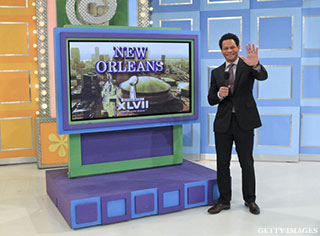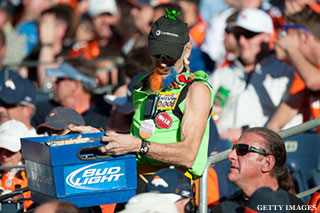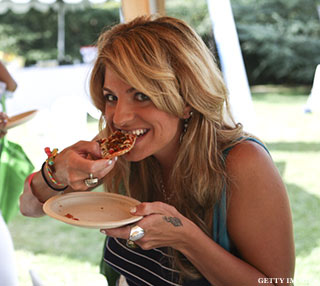By Jason Notte
The Street
Just because a company shelled out billions to become a National Football League sponsor doesn't mean it won't take a beating from rivals the day of the Super Bowl.
The NFL has an official soup sponsor, a tire sponsor, a hot cereal sponsor and even a grooming products sponsor. What it doesn't have is sponsor exclusivity for Super Bowl ads, which allows 2013 Super Bowl broadcaster CBS to let any advertiser in on the game that it wants and open the door for non-sponsor "ambush" advertisers.

It also puts a whole lot of pressure on the NFL's official sponsors to shell out even more cash to maintain their association with the league. According to Kantar Media, the Super Bowl has generated $1.9 billion in ad sales since 2003. Total ad spending climbed from $130.1 million a decade ago to $262.5 million just last year. The cost for a 30-second ad also skyrocketed to $3.5 million from $2.2 million during that span.
Anheuser-Busch InBev paid the NFL $1 billion a couple years ago to wrest the league's official beer sponsorship from MolsonCoors. It's also spent $248.6 million during the past decade to not only air ads for Budweiser and other brands during the Super Bowl, but to buy exclusivity deals from CBS, NBC, Fox and ABC that prevent all other beer companies from buying big-game airtime.
If it seems a bit paranoid on A-B's part, it's just an indication of how high the stakes have become. While the amount of Super Bowl commercial time has increased from 40 minutes and 35 seconds in 2003 to 47 minutes and 25 seconds last year, the number of commercials aired has fallen from 83 to 78 during that same period. With commercials of a minute or more making up 19 percent of all ad purchases last year, there's far too much cash on the table for a company to risk losing its Super Bowl advantage.
Despite their best efforts, however, NFL sponsors are seeing their rivals steal their game day spotlight. Here are just five examples of companies who can't get a moment's peace on Super Bowl Sunday:
Anheuser-Busch InBev
Oh, did we forget to mention that sometimes there are loopholes in those little exclusivity deals A-B signs?

MillerCoors couldn't buy national ads during the Super Bowl thanks to A-B, but it scooped up 15 seconds of regional commercials for its Redd's Apple Ale malt beverage that's launching in February. According to AdAge, MillerCoors bought time in the Great Lakes and Southeast regions to tout its answer to Mike's Hard Lemonade, Boston Beer's Twisted Tea brand and the growing hard cider market. The MillerCoors spot doesn't call out A-B, but just getting it on air is a coup after Coors Light dethroned Budweiser as the nation's No. 2 beer brand last year.
Anheuser-Busch InBev still controls roughly 47 percent of the U.S. beer market, according to Beer Marketers Insights. MillerCoors is second with 28.4 percent of the market. Their grip on the market is slipping, however, as each saw production decrease by 3 percent between 2010 and 2011. Budweiser, in particular, slid from 9.3 percent of the market in 2009 to just 8.4 percent today as Coors Light jumped to an 8.7 percent share -- trailing only Bud Light's 19 percent stake.
MillerCoors's Super Bowl buy isn't big, but it's the little things that are keeping it alive in its battle with A-B.
General Motors
General Motors spent $97.2 million within the past decade on Super Bowl ads alone and found itself in bankruptcy and government hands for its trouble.

Now that it's returned and is preparing to get the government out of its shareholder meetings, the rest of the auto industry has jumped on Super Bowl Sunday as their ad day of choice. Exactly two auto manufacturers bought Super Bowl ads back in 2003. Last year, seven car companies and 12 brands in all joined the fray,
This year, Audi has spent nearly $8 million on a 60-second spot, Ford's Lincoln brand (pictured) has a 60-second spot, Mercedes-Benz has an ad in the fourth quarter and its name on the Superdome host stadium in New Orleans.
Volkswagen, Audi, Hyundai, Kia, Chrysler and Toyota will all have ads as well. GM, meanwhile, is playing with taxpayer money and the last thing Washington wants to do after the fiscal cliff fiasco and amid the debt ceiling debate is spend millions on a Super Bowl ad. GM will sit out the Super Bowl yet again this year while its competition races away with the spoils.
Pepsi
Not only is Pepsi the NFL's soda sponsor, but its Gatorade brand is the league's isotonic beverage sponsor. Also, PepsiCo's Frito-Lay division is the league's salty snack sponsor.
In the past decade, PepsiCo has dumped $182.7 million into Super Bowl ads. Think the NFL thanked PepsiCo for its generosity by keeping hated rival Coca-Cola out of the game? Not a chance.
Coca-Cola's also a frequent NFL advertiser and has spent $81 million within the past decade to make sure its polar bears get the star treatment on Super Bowl Sunday. This year, Coca-Cola is spending nearly $12 million on three 30-second spots in an effort to steal as much as possible of Pepsi pitchwoman Beyonce's halftime spotlight.
Papa John's
Not only did Papa John's owner John Schnatter rub a whole lot of folks the wrong way with his comments about cutting employee hours to avoid the new health care mandate, but his company's big money NFL sponsorship is about to get a tough test on Super Bowl Sunday.
Once again, Papa John's is going without a commercial in favor of game day pizza specials. Yum Brands saw its opening and instead of countering with its own Pizza Hut brand, it's shelling out nearly $8 million on a spot for Taco Bell.

Though the Super Bowl has long been considered more of a beer-and-pizza event, Taco Bell's been making inroads by advertising its $5 Big Box deal during the game in 2010 and making Super Bowl mainstay Doritos the shell of its new Doritos Locos tacos. Oh, and Yum Brands has wisely not said word one about "Obamacare" or any other politically charged issue this election cycle. That may be enough for Taco Bell to pick off Papa John's portion of the holiday spread in several households.
Procter & Gamble
The conglomerate has worked so hard and paid so much to establish its Old Spice as the NFL's deodorant of choice that it would be tragic if some other underarm product beat it to the punch. Especially if that product is pubescent America's masking agent of choice.
Sadly for P&G, Unilever picked this year to give Axe deodorant its first Super Bowl commercial and wasn't exactly subtle about it. For its $4 million, Unilever is both pitching the favored odor fighter of high school locker rooms across America and offering customers 23 seats aboard a private spacecraft for a trip beyond the atmosphere to promote its new Axe Apollo brand.
P&G, meanwhile, has grounded its ad department for this year's Super Bowl and seems content to gaze up at the stars and dream of what could have been. Never mind that faint smell of awkwardness and changing vocal ranges in the background.
More From The Street
-- 10 Craft Beers That Aren't
-- 5 Strangest College Bowl Game Sponsors
-- 10 Iconic American Products Still Made Here




